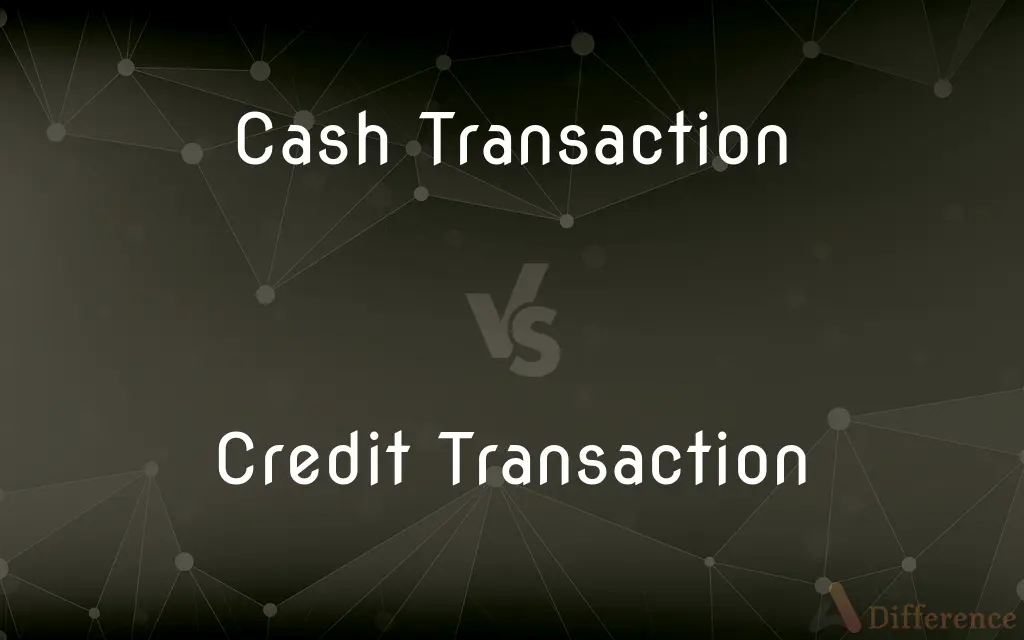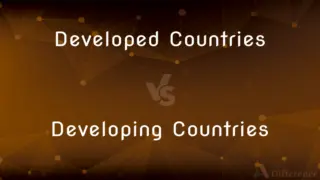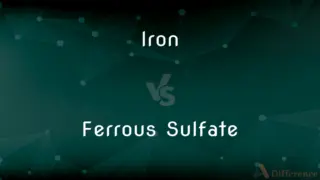Cash Transaction vs. Credit Transaction — What's the Difference?
By Tayyaba Rehman — Published on October 30, 2023
A Cash Transaction involves immediate payment with money, while a Credit Transaction allows deferred payment, typically involving credit terms or a credit card.

Difference Between Cash Transaction and Credit Transaction
Table of Contents
ADVERTISEMENT
Key Differences
A Cash Transaction represents a straightforward mode of payment where money is exchanged at the point of sale or service, and the transaction is considered complete. There's an immediate transfer of funds from the buyer to the seller. In essence, a Cash Transaction means that payment is made on the spot, typically using physical currency or digital cash equivalents. On the other hand, a Credit Transaction offers a delay in payment.
Credit Transactions introduce an element of trust between the involved parties. When using this method, the buyer receives goods or services but promises to pay the seller at a later date. This can be through instruments like invoices which provide terms for delayed payment. Often, Credit Transactions involve intermediaries, such as banks or credit card companies, to facilitate the payment process.
While Cash Transactions offer simplicity, they may limit the purchasing power of a buyer since payment is required upfront. In scenarios where the buyer may not have adequate funds at the moment, a Credit Transaction can offer flexibility, allowing them to acquire goods or services immediately and pay later. This flexibility, however, may come at a cost, as Credit Transactions can sometimes incur interest or fees.
In modern commerce, both Cash Transactions and Credit Transactions play crucial roles. While the former ensures swift closure of deals, the latter can promote purchases by offering buyers time to gather funds. Ultimately, the choice between a Cash Transaction and a Credit Transaction often hinges on the buyer's financial situation and the seller's payment preferences.
Comparison Chart
Timing of Payment
Immediate payment at the point of sale/service.
Payment deferred to a later date.
ADVERTISEMENT
Involvement of Intermediaries
Rarely involves intermediaries.
Often involves intermediaries like banks or credit card companies.
Flexibility
Fixed, requires payment upfront.
Offers flexibility in payment timing.
Interest or Fees
Typically no interest or fees.
May incur interest or fees if payment is delayed beyond agreed terms.
Trust Factor
Low trust factor; payment is immediate.
High trust factor; relies on buyer's promise to pay later.
Compare with Definitions
Cash Transaction
Payment method requiring no deferred terms.
The roadside vendor preferred a Cash Transaction for his fruits.
Credit Transaction
A purchase where payment is deferred to a future date.
She bought the dress using a Credit Transaction and promised to pay next month.
Cash Transaction
A transaction settled with physical currency or immediate digital transfer.
He paid for his coffee using a Cash Transaction through his mobile app.
Credit Transaction
Can incur interest or fees if not settled within agreed terms.
Due to the delay in payment, his Credit Transaction accrued some interest.
Cash Transaction
A trade without credit or delay in payment.
The flea market operates primarily on Cash Transactions.
Credit Transaction
Provides flexibility in payment timings.
Starting their business, they relied on Credit Transactions with their vendors.
Cash Transaction
Immediate exchange of money for goods or services.
She bought the book using a Cash Transaction by handing over $20.
Credit Transaction
Involves trust between buyer and seller.
The supplier allowed a Credit Transaction given their long-standing relationship.
Cash Transaction
Settlement without reliance on third-party intermediaries.
For quick sales, many small businesses prefer a Cash Transaction.
Credit Transaction
May involve intermediaries like credit card companies.
He booked his flight tickets through a Credit Transaction on his card.
Common Curiosities
What is a Cash Transaction?
A Cash Transaction involves immediate payment using cash or its equivalent at the time of purchase.
Are debit cards considered Cash Transactions?
Yes, debit card payments are typically considered Cash Transactions as funds are immediately deducted from the account.
Can Credit Transactions accrue interest?
Yes, if payment terms are not met or a credit card is used, Credit Transactions can accrue interest.
Can I use digital wallets for Cash Transactions?
Yes, digital wallets facilitate electronic Cash Transactions, transferring funds immediately.
Can a Credit Transaction affect my credit score?
Yes, especially if you delay or miss payments related to a Credit Transaction.
Are there fees associated with Cash Transactions?
Typically no, but some digital platforms might charge a nominal fee for electronic Cash Transactions.
How does a Credit Transaction work?
A Credit Transaction allows for deferred payment, meaning you receive goods or services now and pay at a later date.
Is there a trust factor in a Cash Transaction?
Minimal, since payment is made upfront in a Cash Transaction.
Are there any risks with Credit Transactions?
Yes, there's a risk the buyer might default or delay payment in a Credit Transaction.
Do all businesses accept Credit Transactions?
No, especially some small businesses or vendors might prefer Cash Transactions for immediacy.
Why might a business prefer Credit Transactions?
Credit Transactions can boost sales by providing customers flexibility in payment timing.
Can a Cash Transaction be traced?
While physical cash exchanges are hard to trace, electronic Cash Transactions can be tracked through banking records.
Why might a consumer prefer Credit Transactions?
Credit Transactions offer the advantage of buying now and paying later, aiding in cash flow management.
What's a common example of a Credit Transaction?
Using a credit card to purchase items and paying the card bill later is a typical Credit Transaction.
Are checks considered Cash Transactions?
No, checks are a form of Credit Transaction until they're cashed and funds are transferred.
Share Your Discovery

Previous Comparison
Developed Countries vs. Developing Countries
Next Comparison
Iron vs. Ferrous SulfateAuthor Spotlight
Written by
Tayyaba RehmanTayyaba Rehman is a distinguished writer, currently serving as a primary contributor to askdifference.com. As a researcher in semantics and etymology, Tayyaba's passion for the complexity of languages and their distinctions has found a perfect home on the platform. Tayyaba delves into the intricacies of language, distinguishing between commonly confused words and phrases, thereby providing clarity for readers worldwide.












































